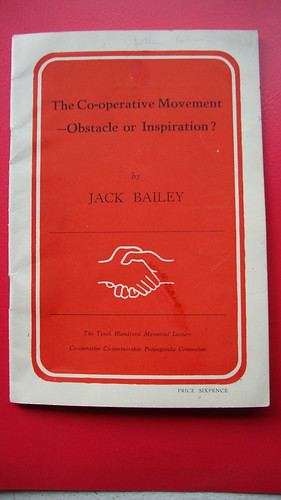 Considering this is only a 23 page booklet it has been a struggle to read and understand it. It is a copy of the 10th Blandford Memorial Lecture delivered by Jack Bailey in 1950, and published by the Co-operative Co-partnership Propaganda Committee.
Considering this is only a 23 page booklet it has been a struggle to read and understand it. It is a copy of the 10th Blandford Memorial Lecture delivered by Jack Bailey in 1950, and published by the Co-operative Co-partnership Propaganda Committee.The story behind the names. Thomas Blandford (1861–1899) was co-operative movement activist being Secretary and the driving force of the Co-operative Productive Federation. Founded in 1882 to promote unity of action amongst the productive societies, securing capital, and finding markets for their products. It had some success in the East Midlands. He died after an illness when only aged 38.
Much later a charitable fund and a series of lectures were inaguarated in his memory. The first lecture was in 1941 entitled Towards Economic Democracy by Herbert Tracey, the publicity officer of the TUC. Harking back to the 19th Century the lectures were published to reach a wider audience. Otherwise nobody outside the room in Leicester where they were delivered would know about them.
There were at least 19 annual lectures which takes us up to 1959. Maybe more? Speakers included Prof. G.D.H. Cole on Co-Operation, Labour and Socialism, Will Lawther, the President of the Miners Federation of Great Britain with Can Industrial Democracy Survive? and Alan Birch, General Secretary of USDAW on Industrial Relations in Co-Operative Employment.
Jack Bailey (1898–1969) then Secretary of the Co-Operative Party had the opportunity to craft his address in 1950. In it he poses three long questions and then answers them or rather in that debating technique asks you to discuss them....He also examines the co-operative principles of self-help, mutual-aid, self-supply, and self-government.
"Whether the state in itself be good or bad, whether the power which os vested in it be used wisely or unwisley I believe it to be bad thing to make it too largely the repsitory of economic and social power"....optimistly he points to a sign that the Labour Party wedded to nationalisation programme is searching for alternative methods of social ownership. It didn't find any.
No comments:
Post a Comment